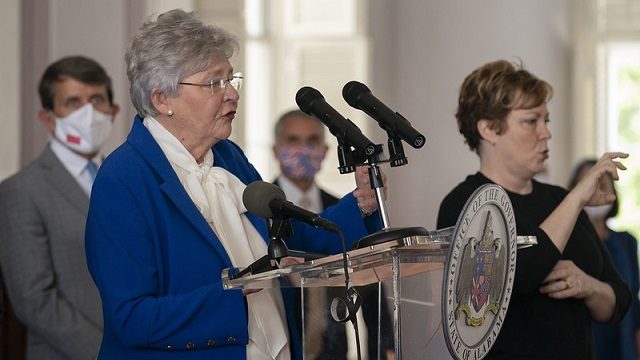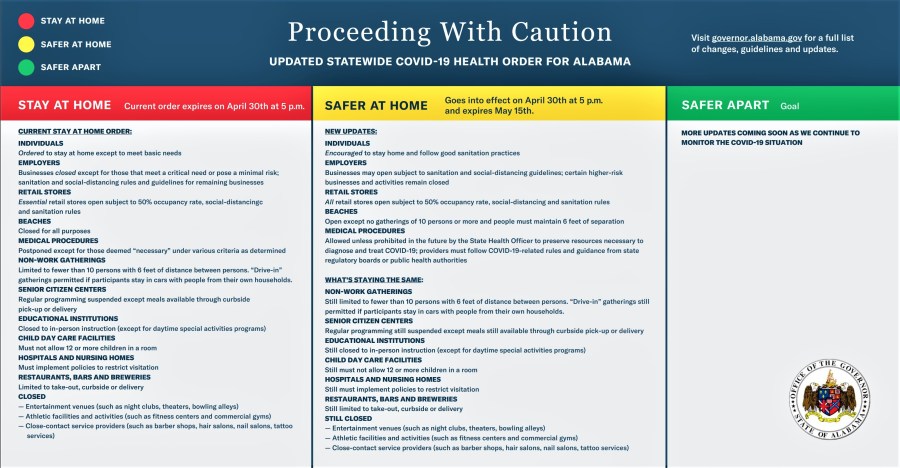
By Michael Tomberlin
Alabama Newscenter
Alabama Gov. Kay Ivey revealed a plan Tuesday that will allow retailers and state beaches to reopen under new rules later this week but restaurants, bars and other businesses will stay closed to the public for now.
The “safer-at-home” order will take effect at 5 p.m. April 30, ending the current “stay-at-home” order that has been in effect since April 4.
Ivey said the public’s adherence to those rules is allowing the relaxing of restrictions. Even though the number of COVID-19 cases continues to rise, Ivey said there is a leveling off and the risk of hospitals becoming overwhelmed is no longer a concern.
“Today, I am announcing that we will once again enter a ‘safer-at-home’ order that will still require social distancing and urge our people to continue taking all health precautions necessary as some people will return to the workplace,” Ivey said. “And while maintaining focus on our personal health, it’s now time that we also focus on our economic health.”
Here are some of the changes that take effect beginning at 5 p.m. Thursday:
- All retailers can open with occupancy limited to 50% capacity as long as social distancing of 6 feet separation can be maintained.
- Beaches can reopen with gatherings limited to fewer than 10 people and distancing of 6 feet of separation is maintained.
- Medical procedures can take place unless the state health officer has prohibited them to preserve resources needed in the fight against COVID-19.
- Individuals are now encouraged rather than required to remain home except to meet basic needs.
Here are some of the measures that remain in effect:
- Restaurants, bars and breweries are closed to the public, with curbside, takeout or delivery services allowed.
- Entertainment venues, fitness centers, barber shops, hair salons and tattoo services remain closed.
- Nonwork gatherings are limited to fewer than 10 people with social distancing of 6 feet of separation.
- Senior citizen centers are still closed to the public.
- Educational institutions cannot resume in-person instruction.
- Child care facilities are still limited to 11 children in a room.
Ivey said Alabamians are being asked to still limit venturing outside of their homes unless they are going to work or to meet basic needs. She said people are urged to wear face coverings and practice hand-washing and good hygiene.
Employers are asked to disinfect their workspaces and take reasonable precautions for their employees and customers.

It’s a cautious reopening of the economy and Ivey asked that the public do so with caution and an adherence to protecting themselves and others.
“My fellow Alabamians, let me be abundantly clear: The threat of COVID-19 is not over,” Ivey said. “We’re still seeing the virus spread and all of our people are susceptible to the infection. The greatest disservice for the people who might be watching me here today is to think that by lifting the comprehensive health restrictions that this must be a sign that there is no longer a threat of COVID-19.”
Ivey was joined at press conference today by State Health Officer Dr. Scott Harris, as well as members of the executive committee of the Alabama Coronavirus Task Force, who presented the governor with the recommendations for reopening the economy.
“I certainly do agree, it’s very reasonable for us to begin a gradual opening like this,” Harris said.
He said Alabama has met two of the three gateway criteria from the White House for reopening the economy. While he feels good about the ability to monitor symptoms and the capacity of hospitals, Harris said the state has yet to see a 14-day decline in the number of COVID-19 cases, which is partly why restaurants, bars, entertainment venues and the like are not reopening now, he said.
“We will continue to monitor the case numbers that we have and, as people get back to work and get back out in public again, we certainly hope that they can maintain the things that they need to do to keep us all safe and healthy,” Harris said. “As Gov. Ivey has mentioned, this really is up to the people of Alabama to keep doing the right thing as they have been doing so far. I have appreciated so much the efforts that I’ve seen from people. So many folks have really done their very best to make sure that they’re keeping themselves safe and keeping their family members safe. We realize that that has been done at great personal cost for many of them.”
Rick Brown, president of the Alabama Retail Association, said his organization’s members have a mixed reaction to the governor’s plan. While traditional retailers are thrilled to be reopening, restaurants and salons are prepared to reopen safely and can’t afford to wait two more weeks to get that chance.
“I understand the reasoning, but these folks are really hurting,” Brown said.
He said barber shops and hair salons have been preparing with employees and customers wearing masks, spreading the chairs out or extending hours to limit the number of stylists in the shop at any time, having customers remain in their cars until they are ready and wearing gloves using hand sanitizer continuously.
Restaurants have also been ready to do business differently, Brown said, by continuously sanitizing menus or even going to a chalkboard or some other touchless ordering system. They’re removing salt and pepper shakers and items from tables and adhering to spacing and other requirements.
Just as retailers and restaurants don’t want to do anything to harm their employees or customers, customers won’t stand for anything they deem to be unsafe, Brown said.
“If a retailer acts in an unsafe manner, they’re going to get instant feedback,” he said. “It’s the same with restaurants. Customers will vote with their feet.”
Brown and the Alabama Retail Association have advocated that it’s safer to have more retailers open to help spread customers out rather than the current system that forces large numbers of customers to fewer large stores. He said retailers throughout the state are preparing to open Thursday night or Friday morning under the new rules.
Harris said concern still exists that the reopening of stores will lead to a spike in new coronavirus cases, but the measured approach announced by Ivey could prevent that.
“We know that we have a ways to go to get completely back where we were, but I think we’re moving in exactly the right direction at exactly the right speed,” he said.
Ivey said there are plans to work directly with the state cosmetology board and the Alabama Restaurant and Hospitality Association to come up with a plan to reopen those businesses as soon as possible.
“We know that what we are announcing today will please some and will make others frustrated that we are not going further at this time,” she said. “But our job must be always to find the right balance – keeping our people safe and healthy as well as focused on the economic health of the state.”
Ivey asked Pastor Jay Wolf of First Baptist Church Montgomery to survey faith leaders throughout the state. Wolf said they agreed to follow White House and Centers for Disease Control and Prevention (CDC) guidelines regarding a return to in-person worship services.
“Now, at this time, Alabama does not meet the criteria proposed by the CDC for reopening houses of worship for large, in-person gatherings,” Wolf said. “Re-opening our places of worship will be a process, not an event.”
As of 2 p.m. Tuesday, there have been 6,644 confirmed COVID-19 cases in Alabama since the outbreak began, with 242 confirmed deaths.
Bill Sisson, president and CEO of the Mobile Area Chamber of Commerce, said businesses in the Port City that can reopen are poised to do so.
“Our members are overwhelmingly telling us they are ready to open,” said Sisson. “We must get the economy open again. Individual businesses must take responsibility to provide a clean and safe workplace for their employees and their customers, following closely the guidelines released by Gov. Ivey during the various phases of back to work.”
Sisson called on the community to continue to support restaurants and bars until state leaders allow them to reopen.
“I would strongly encourage people to still use curbside service and patronize our members as much as possible over the next few weeks,” he said.
Birmingham Business Alliance Interim President and CEO Fred McCallum also weighed in on the need to get all businesses open again.
“The Birmingham business community would like to thank Governor Ivey for making sure the decision to reopen businesses throughout the state was methodical and informed by data, science and input from businesses and elected officials, and vetted through a team of experts in those areas from around the state,” he said. “However, many small- and mid-size businesses in Birmingham are experiencing severe hardship due to closures, and they struggle with a difference of opinion on when and how businesses should reopen. While we appreciate the governor’s cautious approach to the reopening process, we do look forward to the opening of many more businesses on or before May 15, 2020.”



